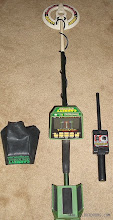Metal Detecting for fun or profit can be one of the most exciting and rewarding of hobbies. A metal detector can cost very little, as low as $50 or higher that $400 for a top of the line model. This is one hobby where you really do get what you pay for, because the more expensive top of the line detectors use the most advanced technology and they have the best features available.
Metal Detectors use one of three types of technology:
Metal Detectors using BFO technology are the ones your likely to get when paying under $100 for, that's right, the cheapest. The BFO technology is the easiest and cheapest to make, thus the prices of the detectors are cheap. The only problem is, BFO technology is very limited when compared to PI and BFO detectors, and the ability to distinguish between junk metals and silver or other coins is very poor.
The first metal detector my wife and I bought together cost about $69.00 it was one of them cheap ones that used the 'BFO' technology. This was one of them metal detectors you see in the magazines that sell other household items, etc. You can buy cheap metal detectors like these at most Radio Shack stores, and some K Marts and Wal Marts. The first day we took the metal detector outside we started finding some Nert things and my wife and I were hooked. We did find our share of junk items in the yard, like aluminum foil, nails and the usual pull tabs and junk metal. But we also found 7 old diecast cars in great condition. They were all different and were 'TOOTSIE' diecast vehicles. I looked on eBay and the bunch was worth around $15 or more. We also found a 1961 silver Roosevelt dime in fine condition, in our yard, plus the usual pennies.
After reading about how the 3 different types of Metal Detector technologies work and differ from each other, you must decide how or what you will be mostly using your metal detector for. Will you be hunting for small objects like coins, jewelry and gold nuggets, or searching for a large cache or object. The things you may want to use your detector for, play one of the most important factors besides pricing in deciding what type of detector to buy. Most folks want a detector that is great at finding coins, gold nuggets, and jewelry on the land and in small creeks and streams, this would be a detector using 'VLF' technology. Almost all of the modern detectors have a waterproof search coil which make searching in shallow creeks and streams possible.
There is Computer Software that is made just for the hobby of Metal Detecting. The software is called: Metal Detector - Treasure Hunter Professional, and may be seen at this website address: http://www.rb59.com/md/meal.html Read More....
By Robert W. Benjamin
Metal Detecting

